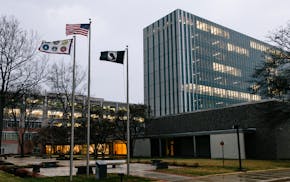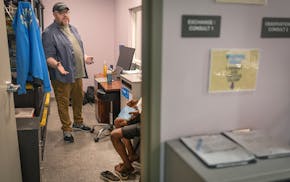MANKATO – Sumaiya Abeer took the microphone, her gaze sweeping over the crowd gathered to celebrate her and other international students on the cusp of graduating from Minnesota State University, Mankato. In front of her was a crowd of giddy soon-to-be graduates and their families from all over the world.
Abeer, the president of the Muslim Student Association, thanked her parents from Bangladesh who had traveled to Mankato to cheer her on, as well as her two brothers who had studied with her.
Then she turned her attention to the wider Mankato community and offered thanks for something fresh in the minds of many in the room: the support that she and other international students have received during what had been a "scary, very scary" past few months.
"Thank you to everyone who supported us in our hard times," Abeer said.
International students across Minnesota said they lived in fear this spring after a wave of unexpected visa revocations and detentions by U.S. Immigration and Customs Enforcement (ICE). At Minnesota State Mankato, the arrest of student Mohammed Hoque and the sudden termination of a dozen student visa records sent ripples of fear through the campus. Students like Abeer, far from home and family, suddenly found themselves unsure if they could continue their studies or even remain in the United States.
But amid this climate of uncertainty, international students said that people and organizations in Mankato rallied to provide a network to support them. University officials and faculty, local church groups, neighbors and fellow students provided everything from groceries and legal aid to emotional reassurance and offers of safe places to stay.
For students like Abeer, who had arrived in Mankato four years ago harboring fears about being accepted in a new country, the community's response was a profound and welcome surprise.
"I never expected, you know, this large of a community to willingly help us," said Abeer. "Seeing people rallying to say, 'OK, no, you cannot harm international students.'… Like, wow, I actually have that kind of support."
Climate of fear
The rumors on campus began buzzing in whispers and on countless WhatsApp group chats at the end of March. Mohammed Hoque, a 20-year-old international student from Bangladesh, had been arrested by ICE agents while returning home from a coding class.
Shortly after came reports that dozens of students across Minnesota had their records terminated within the Student Exchange Visitor Information System. The cancellation of these records, which serve as digital proof of visa status, threatened students' education and their work authorizations. At one point, at least 50 students in Minnesota had their visa records terminated, with a dozen of them confirmed at Minnesota State Mankato.
Nationally, at least 1,220 students at 187 colleges and universities either had their visas revoked, their legal status terminated, or both, an Associated Press report in late April said.
U.S. Secretary of State Marco Rubio said some student visas had been revoked for cause, arguing the federal government had the right to do so with students who "participate in movements that are involved in doing things like vandalizing universities, harassing students, taking over buildings, creating a ruckus."
But immigration attorneys and school officials said many international students were being singled out for minor infractions, often misdemeanors that wouldn't have ordinarily triggered such severe consequences. Among students, the sudden policy change along with a lack of clarity fueled anxiety.
For Abeer, the crackdown on international students and their visas seemed to confirm her family's deepest fears about America as a place that would not accept her. When she first arrived in Mankato four years ago, she and her family worried whether people would accept her upon seeing her hijab.
Hoque's arrest made her afraid every time she left home and every time she returned from school. Every time she drove, she said, she'd eye cars behind her, wondering if agents were following.
"Home, class. Home, class," went the rhythm of her days, she said. Her parents had worked hard to save money for her and her two brothers to study at Minnesota State Mankato, and they were worried for her. She restricted her movements to essential trips only, a pattern other international students said they adopted this spring.
"The carefree innocence of being a college student … I think that's gone right now," said Duane Olson, a Mankato retiree involved in the university's Friendship Family Program. The program connects international students with locals wanting to help them feel at home. But no one wanted to leave campus to go on trips to the Mall of America or Wisconsin Dells, Olson said: "It's more fear than fun."
'This community rallied'
As anxieties mounted, local groups and the university mobilized to help international students. School officials and student government connected students with legal aid and hosted "Know your rights" sessions. The campus food pantry and a local church offered groceries and basic necessities. Advocates organized protests for Hoque's release. And international students said they shared information and reassurance via WhatsApp groups.
The calls offering help came immediately, one student recalled. The student, who asked to remain anonymous due to ongoing fears of being targeted for speaking out, said she had been scared to leave her apartment. At one point, her refrigerator stood empty.
But friends and well-wishers offered to deliver groceries and give her rides, and they even offered their homes as a safe place to stay. That helped her finally go back to campus. It "made me feel a little bit safer here, just because I had a community that really supported me," she said.
For Abeer, one of the most touching gestures came from some older neighbors. When they approached, she said she was afraid at first — but then they asked if they could give her a hug. They told her everything was going to be fine and to focus on her final exams: "Just know that if any such thing happens, we are gonna be the ones protecting you."
By late April, the federal government reversed its stance on many of the visa revocations after a series of lawsuits, and Hoque was released from detention on bond. Will Coghill-Behrends, the school's dean of global education, said students whose visas had been revoked and reinstated were able to continue their courses. He said the university will work to help Hoque complete his studies.
Reflecting on the past semester, Coghill-Behrends said he will remember "the incredible way that this community rallied behind their students." But he acknowledged the fear hasn't entirely disappeared, with some students not knowing what they will do after graduation and canceling plans to go home, due to concerns that they won't be able to come back.
"I think people are still afraid," Coghill-Behrends said.
Abeer's family and friends cheered as she walked the commencement stage Saturday. While her last semester validated some of her fears about the U.S. when she arrived, she said it had also revealed an unexpected capacity for kindness in Mankato.
"Four years later, I'm just being me and being accepted as being me, and being respected as well," Abeer said. "That's a very big change that I didn't expect."

Trump races to fix a big mistake: DOGE fired too many people

St. Paul sees 'unprecedented' day care closures, sending families scrambling

One man dead in shooting Friday outside Northtown Mall in Blaine

Four arrested, no one injured in fighting and shooting following Burnsville High School graduation

